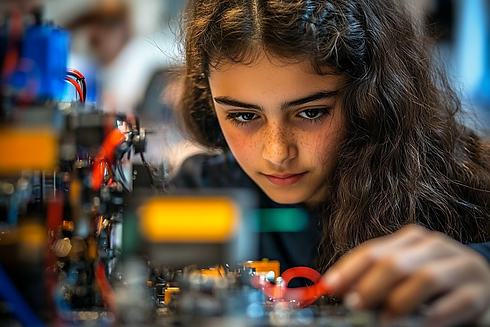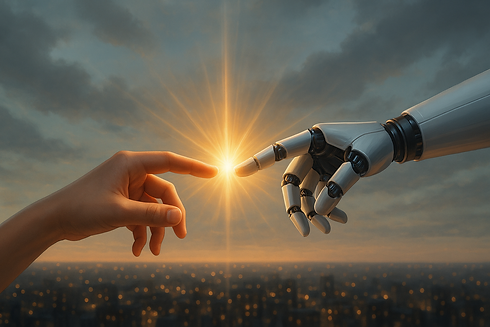
The Why
"...the only thing any of us can predict from here is that in the next 5-10 years, there is going to be an incredible amount of disruption and change due to technology..."
- Demis Hassabis
(Co-founder & CEO of Google DeepMind)
The Future of Learning in an AI-Driven World
In today's rapidly evolving technological landscape, traditional education systems are struggling to keep pace with change. The World Economic Forum reports that over half of all employees worldwide will require significant reskilling or upskilling in the coming years just to remain competitive in the changing job market.
This new reality demands a fresh approach to education—one that's adaptable, accessible, and forward-thinking. Fully online asynchronous learning has emerged as a compelling solution, merging the latest in technology with pedagogical innovation to empower self-driven learners. Rather than merely adapting to the future, this model actively prepares students to lead it.


The Dual Nature of Skills in an AI Economy
As we transition to an AI-driven economy, the skills landscape is evolving in two critical directions:
First, there's a growing demand for technical proficiency. STEM education, coding abilities, and AI literacy are becoming essential for students and workers who will build and collaborate with intelligent machines. Understanding how AI works—its capabilities and limitations—is rapidly becoming as fundamental as computer literacy became in previous decades.
Simultaneously, as AI increasingly handles routine cognitive tasks, uniquely human capabilities are becoming more valuable than ever.
The Ark Institute Framework
At Ark Institute, we've developed an educational framework designed specifically for this new era. Our model modernizes education for the AI age through five interconnected pillars:
1. Technological Literacy: We introduce robotics, computational thinking, coding, and AI concepts at a younger age in order to establish familiarity and insight with technology's inextricable presence in our lives. And while not everyone needs to be a software engineer or roboticist, everyone will become an AI user and work alongside intelligent systems. By mastering the craft of collaborating with technology rather than just consuming it, learners gain the new baseline skill set that tomorrow’s workplaces will expect, much as basic computer skills once were.
2. Developing Human-Essential Skills: Our approach transcends traditional memorization and routine tasks—areas where AI increasingly excels—to focus on the uniquely human qualities that drive innovation and meaningful connection. We prioritize developing creativity, critical thinking, collaboration, communication and presentation, social-emotional intelligence, adaptability and self-directed learning, and purpose and self-reflection.
3. Comprehensive Interdisciplinary Coursework: We structure our coursework around five all-encompassing subject areas that transcend traditional academic boundaries, enabling students to develop versatile perspectives and integrative thinking skills. These are:
-
-
Environmental Stewardship & Sustainable Resource Management
-
Social Sciences, Ethics & Community Building
-
Health, Medicine & Well-being
-
Science, Technology & Innovation
-
Arts, Culture & Creative Expression
-
4. Continuous Curriculum Updates: Our curriculum is flexible and responsive to the continuous shifts in industry and society as a whole. By maintaining industry-education awareness, we modify and update our coursework as frequently as needed, ensuring that learning is as relevant as possible for our students.
5. Lifelong Learning Mindset: We understand that in today's world, the most valuable skill isn't what you know, but how you learn. By mastering the art of self-directed learning, leveraging technology, and solving real-world challenges, our students develop the habits, curiosity, and resourcefulness that turn every experience into an opportunity for growth.
